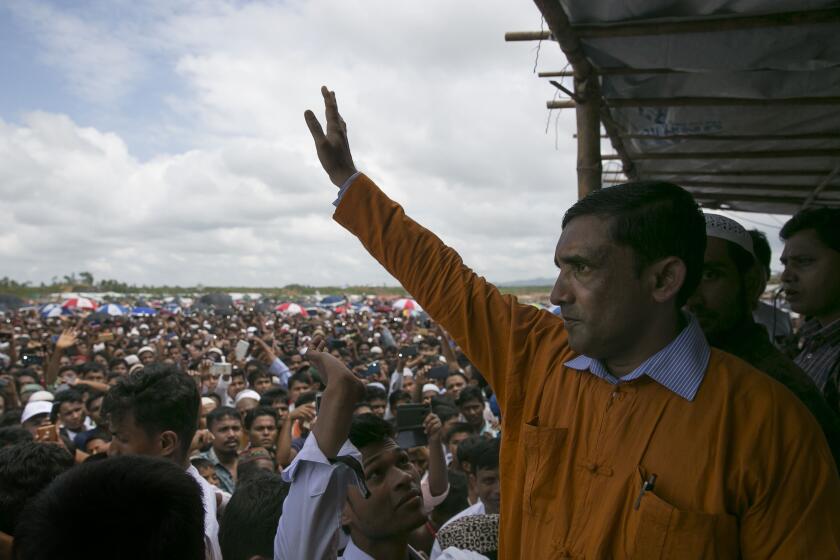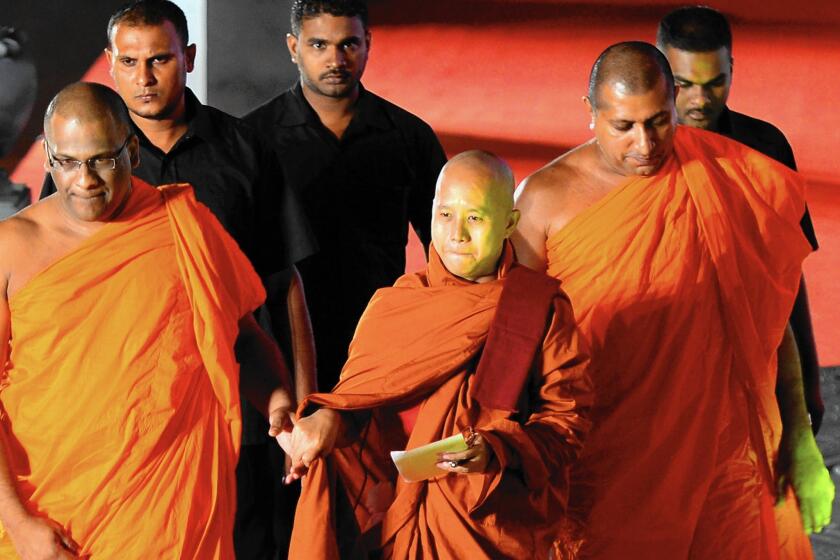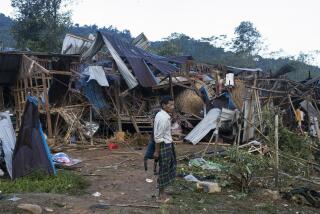Buddhists fight violence against Muslims with flower power
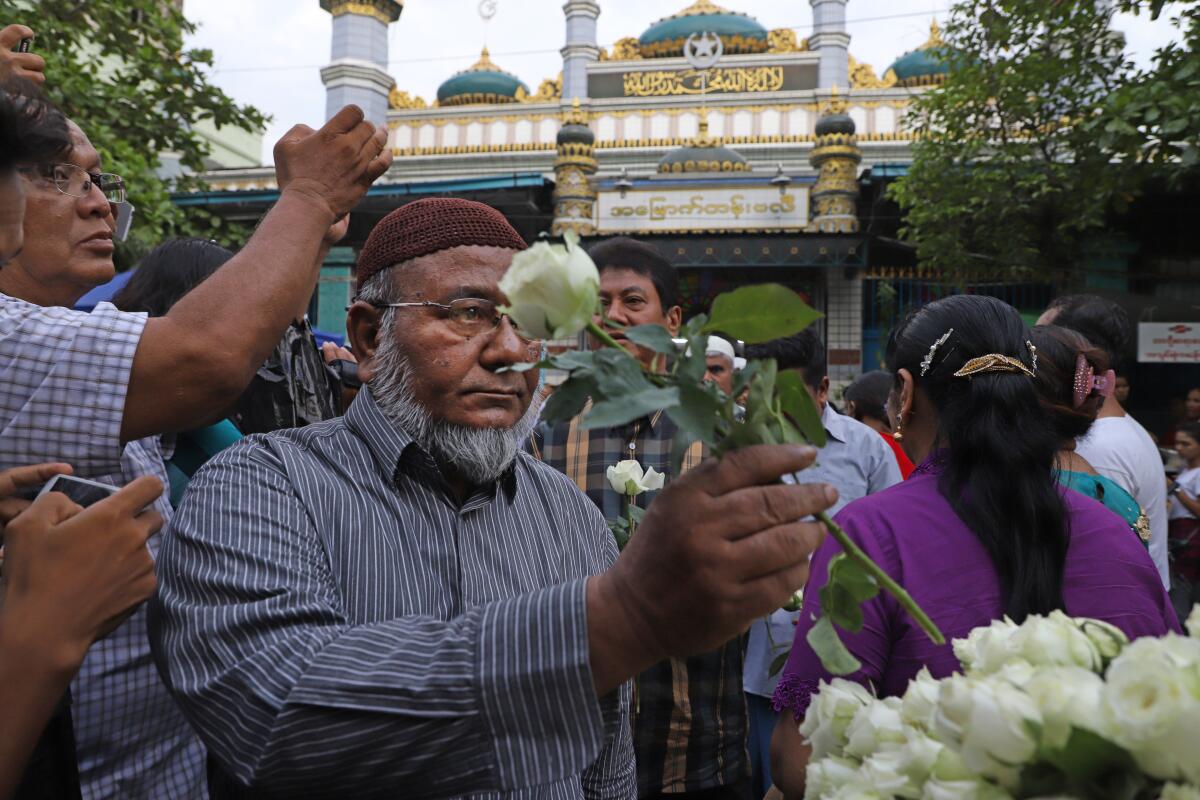
In May, during the Islamic holy month of Ramadan, roughly 100 Buddhist nationalists armed with sticks and stones surrounded three Muslim prayer sites, blocking worshipers from praying.
It was another example of members of the Buddhist majority intimidating Muslims in Myanmar, where a transition to democracy after half a century of military rule has been accompanied by a rise in ultranationalist sentiment and religious violence.
The night after the incident, Thet Swe Win, a longtime peace activist, convened a group of like-minded Buddhist friends and interfaith activists to brainstorm ways to show solidarity with the Muslim minority. He recalled a visit to Paris in 2015, where he saw Muslims handing out flowers after a terrorist attack there, and was inspired by the gesture of empathy.
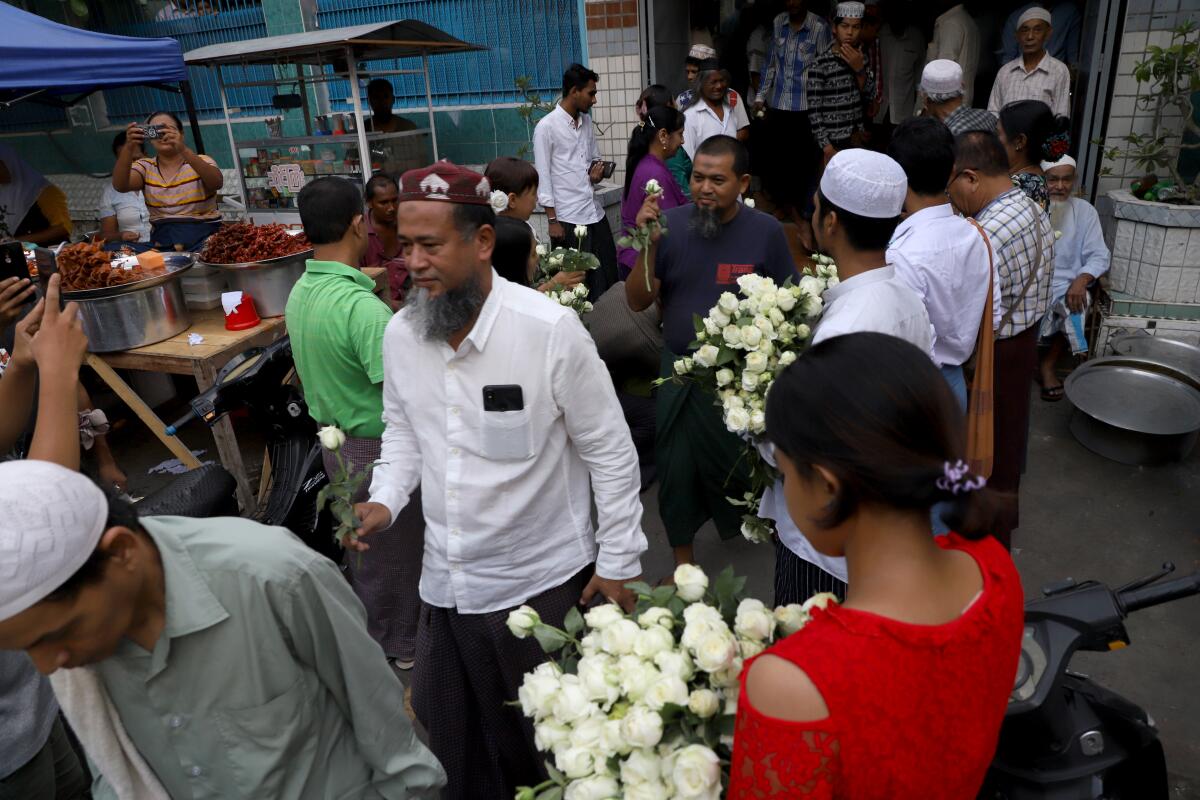
That same night, Thet Swe Win’s group, along with a Buddhist monk who has been a vocal advocate for interfaith harmony, Sayadaw Badata Seindita, gathered at one of the prayer sites and handed out white roses to Muslims.
The “white rose campaign” soon spread from Yangon, Myanmar’s biggest city, to more than 20 mosques and Muslim prayer sites across the country and has become a potent symbol of interfaith relations in a country where few voices speak out against anti-Muslim rhetoric and violence.
“I’m doing this work because only a few people are doing it,” said Thet Swe Win, 33. “I’m trying to mobilize people to be more responsive.”
We have to stand up for vulnerable communities as a basic Buddhist principle…. As the majority, we need to use our freedom and power to defend the marginalized.
— Thinzar Shunlei Yi, an activist in the white rose campaign
He has spearheaded a series of campaigns promoting interfaith harmony, a controversial idea in Myanmar, also known as Burma, in part because it challenges the hard-line views of some of the country’s 500,000 Buddhist monks, who hold a revered place in society and can play an influential role in politics.
Since beginning its democratic transition in 2011, Myanmar has seen increasing propaganda from Buddhist and secular leaders claiming that Muslims — who make up an estimated 4% of the country’s 54 million people — threaten to “swallow” Buddhists, who account for 88% of the population.
Religious riots throughout the country have at times turned deadly, while Yangon has been hit with sporadic mob attacks on prayer halls, Islamic schools known as madrassas and Muslim-owned shops.
In 2012, violence erupted between Rohingya Muslims and Buddhists in the western state of Rakhine, forcing more than 100,000 Rohingya from their homes.
Rakhine state again saw violence in 2016 and 2017, after attacks on military outposts by a Muslim militant group called the Arakan Rohingya Salvation Army. In 2017, the Myanmar army launched a campaign of rape, arson and killing against Rohingya civilians that sent an estimated 730,000 fleeing into Bangladesh, and which United Nations investigators found was carried out “with genocidal intent.”
Rohingya leader Mohib Ullah’s outspokenness has made him the target of death threats and created headaches for authorities in Myanmar and Bangladesh.
The civilian government led by Nobel Peace Prize laureate Aung San Suu Kyi has failed to condemn the violence, tarnishing her reputation internationally. But many in Myanmar support the narrative that the Rohingya are illegal immigrants from Bangladesh and should be expelled.
Thet Swe Win said he began speaking out against violence targeting Muslims in 2012, when he was dismayed to find many of his fellow pro-democracy and peace activists staying silent on the issue.
“Not doing anything is not enough. Civil society are the front-line defenders of human rights and human values,” Thet Swe Win said. “We have to be proactive.”
The 2012 violence also marked a turning point for Thinzar Shunlei Yi, an activist who joined Thet Swe Win in the white rose campaign.
Raised as a Buddhist on a military compound where she had little contact with Muslims, she said she held Islamophobic sentiments as a child. It was only after she began connecting with young pro-democracy campaigners from different backgrounds that she felt her mind-set began to shift toward embracing religious diversity.
Now 27, she said her engagement in interfaith activism, including the white rose campaign, draws from her belief in the concept of “loving-kindness,” a central tenet of Buddhism.
“The philosophy is there, to love every human being. There are no exceptions,” she said.
“We have to stand up for vulnerable communities as a basic Buddhist principle…. As the majority, we need to use our freedom and power to defend the marginalized.”
The Buddhist monk who participated in the white rose campaign, Sayadaw Seindita of the Asia Light monastery in the central town of Pyin Oo Lwin, said he participated despite knowing he might be targeted by hard-line monks — some of whom did attack him online — because he wanted to “show the real image of Buddhism” through a display of empathy and respect for other religions.
This approach lies in stark contrast with that of a group of Buddhist monks who emerged in 2011 as leaders of a 969 Movement, later rebranded as Ma Ba Tha, or the Assn. for the Protection of Race and Religion. The movement stoked fears of Islam as an existential threat to Myanmar’s Buddhist identity.
He’s been described as the “Buddhist Bin Laden,” but Ashin Wirathu thinks he has more in common with the world’s most famous fictional spy.
After Ma Ba Tha was banned in 2017, a group called the Buddha Dhamma Parahita Foundation soon emerged in its place. The group has received financial donations in the tens of thousands of dollars from senior military personnel.
“Throughout the political changes in the country, Buddhism has been used as a tool,” said Sayadaw Seindita. “If we [Buddhists] don’t speak up for religious minorities or share a message of loving-kindness, the image of Buddhism can be destroyed.”
Zaw Min Latt, a Muslim business owner who was at the prayer hall that night, praised the white rose gesture, saying it established a connection between the members of the two faiths.
“The roses represent peace,” he said. “As a citizen of this country, I also want Myanmar to be peaceful. I saw that we have the same intention.”
The white rose campaign has since shifted toward an awareness campaign using billboards and music videos promoting interfaith themes.
Its participants have often faced harassment.
Thet Swe Win’s friends have received phone calls from unknown numbers, accusing him of infidelity. Internet rumors suggested that his wife’s spa business was funded by Muslims. Once, nationalist monks showed up unannounced at his office, asking for him.
Photos have circulated online of the activists and their family members, along with offensive comments.
“Whenever you are pictured with Muslims, it can be misused on different platforms,” said Thinzar Shunlei Yi. “When you are young, when you’re a woman, when you talk about unpopular ideas, like interfaith harmony or understanding towards minorities, you are targeted.”
She said that being targeted has only strengthened her resolve, and she hoped Myanmar’s youth would come together to promote unity.
“The younger generation is changing. I myself have changed; I am proof to the world,” she said. “We need to have our own narrative, our own way.”
Fishbein is a special correspondent.
More to Read
Start your day right
Sign up for Essential California for news, features and recommendations from the L.A. Times and beyond in your inbox six days a week.
You may occasionally receive promotional content from the Los Angeles Times.
